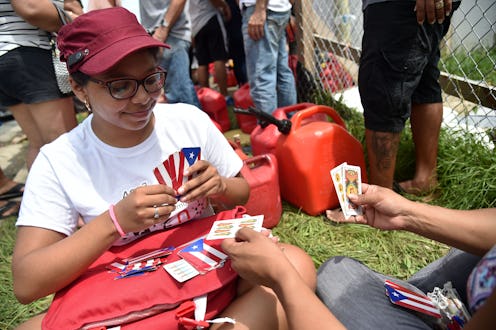News
Almost Half Of Americans Don't Know Puerto Ricans Are, Well, Americans

Hit by Hurricane Irma and then devastated by Hurricane Maria, Puerto Rico is teetering on the brink of a humanitarian crisis. Electricity has been wiped out for most of the island. Hospitals report they will soon be out of basic supplies. And yet, news reports are either nonexistent or subdued compared to the wall-to-wall coverage of Houston after Hurricane Harvey or Florida after Hurricane Irma. Perhaps that is in part because nearly of half of Americans don't know that Puerto Ricans are citizens, not foreigners. The growing possibility of catastrophic human loss might garner more attention if Puerto Ricans were more widely known as American citizens.
Conducted by Morning Consult, a new poll of 2,200 adults revealed that just 54 percent of those surveyed correctly identified Puerto Ricans as American citizens. As a commonwealth, Puerto Rico is not a state, and thus it has extremely limited political influence at the federal level.
Puerto Ricans received U.S. citizenship 100 years ago, in 1917. That's just five years after Arizona and New Mexico and 10 years after Oklahoma were admitted as states. It also gives the island commonwealth a 40-plus year head start on Alaska and Hawaii. In other words, Puerto Ricans have been recognized American citizens longer than Alaska or Hawaii have been official American states. Yet somehow, almost half of U.S. adults don't grasp that Puerto Rico's tragedy is their own.
Puerto Rico has been legally tied to America in some sense since 1898, when the Spanish lost the Spanish-American War and ceded Puerto Rico, Guam, and Cuba to the United States. Puerto Rico officially became a U.S. commonwealth in 1952, and has been engaged in heated debate ever since over the issue of statehood.
One of the staunchest public figures advocating in favor of statehood is Jennifer González-Colón. She is Puerto Rico's one elected member of the U.S. House of Representatives. Though González-Colón is not permitted to vote on measures, she does represent the interests of Puerto Rico in D.C. She has also helped to craft legislation on a number of issues, from veterans' services to domestic violence prevention. According to her biography, 61 percent of Puerto Ricans are in favor of Puerto Rico becoming the 51st state.
It may surprise many Americans to learn that residents of Guam, the Northern Marians Islands, and the U.S. Virgin Islands are also American citizens. (OK, maybe not so surprising on that last one.)
The president has come under fire over the past several days for his perceived lack of focus on the humanitarian crisis unfolding in Puerto Rico. With over three million people living mostly without electricity, 60 percent without running water, and under-sourced hospitals and rescue efforts, the president chose to focus on NFL players who have knelt in the past during the national anthem in protest of police brutality.
His comments at a rally on Friday night, which included calling a protesting player a "son of a bitch," drew a quick and fierce backlash. While only a handful of football players had been kneeling for the past few weeks, over the weekend more than 130 took a knee.
The very public nature of that stance and the subsequent tweet commentary from Trump have taken the lion's share of media coverage. And that certainly explains some of the absent media coverage of Puerto Rico's crisis.
But that nearly half of American adults on the mainland remain ignorant of Puerto Ricans' U.S. citizenship has likely also played a contributing role in the lack of media urgency. It's difficult to imagine 3 million Americans in Texas, or California, or New York being left without power and running water being treated to the same feeble attention.